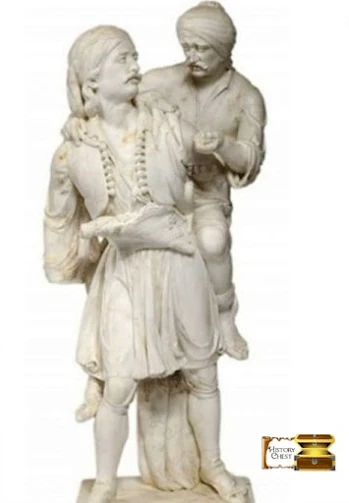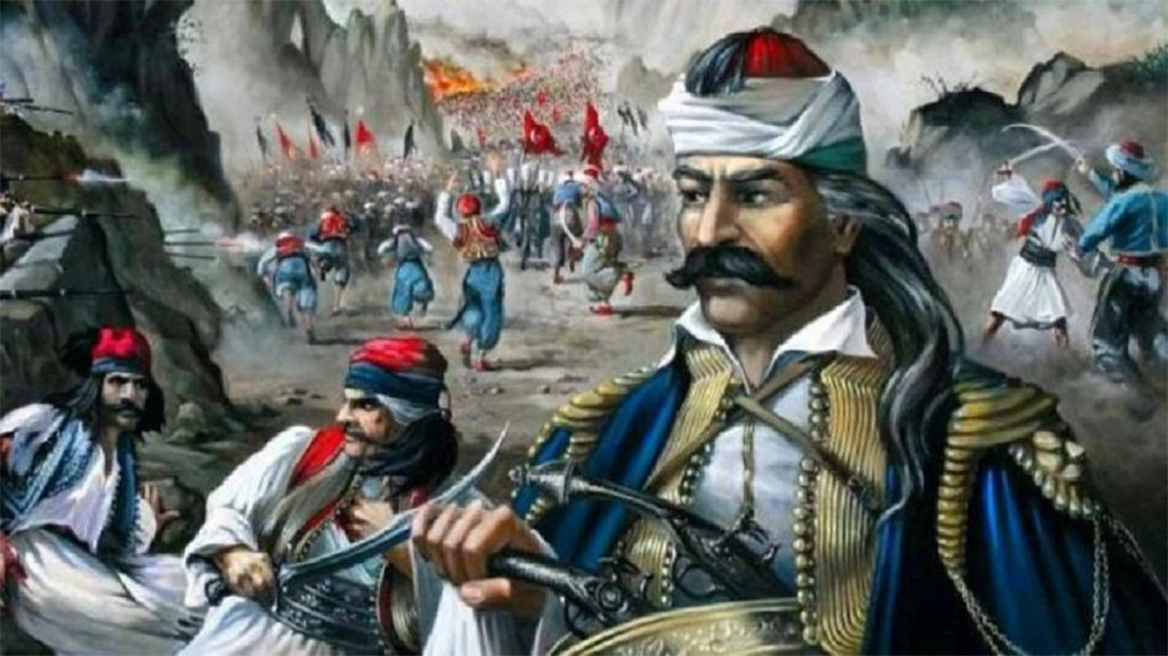ΗΛΕΚΤΡΟΝΙΚΉ ΕΦΗΜΕΡΙΣ ΠΟΛΙΤΙΣΤΙΚΉ ΙΣΤΟΡΙΚΉ ΟΡΘΌΔΟΞΗ ΤΩΝ ΚΟΡΥΤΣΑΙΩΝ ΗΠΕΙΡΩΤΏΝ - GAZETË ELEKTRONIKE, KULTURORE, HISTORIKE, ORTHODHOKSE E KORÇARËVE EPIROTË
Εμφάνιση αναρτήσεων με ετικέτα ιστορία-historia. Εμφάνιση όλων των αναρτήσεων
Εμφάνιση αναρτήσεων με ετικέτα ιστορία-historia. Εμφάνιση όλων των αναρτήσεων
Πέμπτη 25 Μαΐου 2023
Δευτέρα 1 Μαΐου 2023
Παρασκευή 28 Απριλίου 2023
Η ΔΥΝΑΜΙΚΗ ΚΟΙΝΗΤΟΠΟΙΗΣΗ ΣΤΗΝ ΦΛΩΡΙΝΑ, ΣΤΙΣ 23.8.1986!!
Η ΔΥΝΑΜΙΚΗ ΚΟΙΝΗΤΟΠΟΙΗΣΗ ΣΤΗΝ ΦΛΩΡΙΝΑ,
ΣΤΙΣ 23.8.1986
ΑΠΟ ΤΟΝ ΓΕΡΟΝΤΑ ΑΓΩΝΙΣΤΗ, ΕΛΛΗΝΑ, ΟΡΘΟΔΟΞΟ ΙΕΡΑΧΗ ΤΗΣ ΦΛΩΡΙΝΑΣ ΑΥΓΟΥΣΤΙΝΟ Ν. ΚΑΝΤΙΩΤΗ. ΜΑΝΤΡΩΣΕ ΤΟΥΣ ΑΛΒΑΝΟΥΣ ΤΟΥ ΕΒΕΡ ΧΟΤΖΙΑ ΣΤΟ ΜΙΚΡΟ ΠΑΛΑΙΟ ΓΥΠΕΔΟ ΤΗΣ ΦΛΩΡΙΝΑΣ
Τετάρτη 29 Μαρτίου 2023
Η ΣΥΜΜΕΤΟΧΗ ΤΩΝ ΒΟΡΕΙΟΗΠΕΙΡΩΤΩΝ ΣΤΗΝ ΕΘΝΙΚΗ ΠΑΛΙΓΓΕΝΕΣΙΑ ΤΟΥ 1821

Κατὰ τὸ ἔτος 1430 τὰ Ἰωάννινα καταλαμβάνονται ἀπὸ τοὺς Ὀθωμανούς, ὑπὸ τὴν ἀρχηγία τοῦ Σινᾶν Πασᾶ, ὁ ὁποῖος τὴν 9η Ὀκτωβρίου τοῦ ἰδίου ἔτους, δεσμεύτηκε ἐγγράφως γιὰ τὸ σεβασμὸ πολλῶν προνομίων τῆς Ἐκκλησίας, καθὼς καὶ τῶν κατοίκων τῆς πόλεως. Ὡστόσο ἤδη ἀπὸ ἐκείνη τὴν περίοδο ἡ ἀντίσταση κατὰ τῶν κατακτητῶν δὲν ἔλειψε, μὲ τὸν ἀγωνιστὴ Λάμπρο Πάλλη ἀπὸ γνωστὴ οἰκογένεια τῆς Παραμυθιᾶς νὰ ξεχωρίζει .
Πέμπτη 23 Φεβρουαρίου 2023
Δευτέρα 20 Φεβρουαρίου 2023
Τρίτη 7 Φεβρουαρίου 2023
Παρασκευή 20 Ιανουαρίου 2023
Πέμπτη 19 Ιανουαρίου 2023
Linguistic Maintenance and Cultural Idiosyncrasies in Greece’s Arvanitic Speaking Communities-Mesimi i Arvanishtes ne Greqine e fundit te shekullit te 19-te dhe fillimt te shekullit te 20-te; Ruajtja e gjuhes dhe vecorite kulturore te komuniteteve Arvanishtfolese ne Greqi.
Theodore G. Zervas
(Chicago)
Historical Origins
Most historians agree that the Arvanites first settled central and southern Greece in the thirteenth
century. A succession of migrations into Greece continued
until the early nineteenth century. The Arvanites are thought to have
originated from parts of present day Albania.
Their identity has been linked to their
Arvanitic (Arvanitika) or Tosk Albanian language and their practice of Greek Orthodox Christianity.
One
of the earliest accounts to mention the Arvanites is from Anna Comnema (1083–1153 ACE) in the twelfth century,
where she briefly
describes a town
and people from Durrës in present day Albania called Arbanus (Sewter 2009).
It is here, that contemporary historians believe the name Arvanite or Αρβανíτες originated. Later
Byzantine accounts describe them as Christians
who settled in parts of present day
southern Albania and northwestern Greece. It is also said that they were
encour- aged by Byzantine officials
to migrate south in undeveloped and
under-populated ar- eas of Central Greece
and the Peloponnese where many of these communities still live today.
Historians and anthropologists
continue to debate the Arvanites geographic and ethnic origins. Some have characterized them as a “hybrid”
Greek/Albanian culture since they speak both Greek and Albanian while others mostly nationalists in both Greece and Albanian
have claimed them to be purely Greek or purely Albanian.
For
nearly 900 years Arvanite towns were scattered
around Athens in
Attica, Central Greece,
Southern Euboea, Corinth,
the Argolis, western
Laconia and many of
the Soronic and Cycladic Islands in the Aegean. For some time the Arvanites was Greece’s biggest public secret in that the
Greek state had always been aware of them, but reluctant
to acknowledge that the language
they spoke was not Greek (Mag- liveras 2009).
After the creation of the modern
Greek state in 1827 the Arvanites identified as being almost exclusively
Greek or Greek
Orthodox Christians, but
preferred to speak Arvanitic instead
of Greek. The Greek state
had also seen
them this way, mainly because
they had participated the Greek Revolution and had been active in the political
and cultural life of Greece.
At the same time, the Arvanites remained mysterious and many Greeks assumed that the Arvanitic language was ancient northern Greek dialect. But when Albanian immigrants began flooding into Greece in the 1990s (after the collapse of communism in Albania) it became apparent that Arvanitic was not Greek at all, but an “old” Tosk Albanian dialect. Arvanite communities nonetheless clung to their Greek national identity. They found it offensive to be called Albanians and were quick to point out differences between themselves and the Albanian immigrants.
While Greek and Albanian are distinct languages within the Indo-European clas- sification of languages, they share many similarities in syntax and grammar. There are even ancient Greek words in the Arvanitic that are not used in Modern Greek. The word for mouse, μι in Arvanitic, is the ancient Greek word for mouse μις. Νουκ for the contraction “not” in Arvanitic is suspected to derive from the ancient Greek of ουκ. The Arvanitic word for house, στεπή is also thought to derive from the ancient Greek word σκεπή. Similarly, hades is often used when referring to the underworld or afterlife. There are about 30 ancient Greek loan words in Arvanitic, but many lin- guists suspect that there are likely more. At the same time, colloquial Greek has adopted many Albanian words. George Babiniotis attributes about 50–75 words used in Modern Greek that derive from Tosk Albanian (Babiniotis 1998). Some examples include: γκομáρι for donkey, γουβα for ditch, λουλουδι for flower, μπέσα for the intransitive verb “come”, καλικουτσα to carry on ones back, λουτσα to be soaked, σβέρκος for neck, and σíγουρα, for the adverb “clearly” or “certainly”.
Παρασκευή 16 Δεκεμβρίου 2022
Τρίτη 22 Νοεμβρίου 2022
Η μάχη Μόροβας – Ιβάν και η απελευθέρωση της Κορυτσάς (14 – 22 Νοεμβρίου 1940)
.
Υπλγός (ΠΖ) Ξιφαράς Δημήτριος, του Τμήματος Ιστορίας Φιλοσοφικής Σχολής ΕΚΠΑ
Διεύθυνση Ιστορίας Στρατού
ΑΠΕΛΕΥΘΕΡΩΣΗ ΤΗΣ ΚΟΡΥΤΣΑΣ ΑΠΟ ΤΟ Γ΄ ΣΣ.
Η ΠΡΩΤΗ ΑΠΕΛΕΥΘΕΡΩΣΗ ΠΟΛΗΣ ΣΤΗΝ ΕΥΡΩΠΗ ΠΟΥ ΚΑΤΕΧΟΤΑΝ ΑΠΟ ΤΙΣ ΔΥΝΑΜΕΙΣ ΤΟΥ ΑΞΟΝΑ, 22 ΝΟΕ 1940
Παρασκευή 18 Νοεμβρίου 2022
Τετάρτη 2 Νοεμβρίου 2022
Τετάρτη 26 Οκτωβρίου 2022
Αγιον Ορος: Ο άγνωστος θησαυρός των οθωμανικών χειρογράφων αναδύεται - Otomanët e mirë, dorëshkrime që tregojnë një histori ndryshe
Τα πρώτα έγγραφα της οθωμανικής ιστορίας σώζονται στο Άγιο Όρος και φανερώνουν πως οι Οθωμανοί πήραν τη μοναστική κοινότητα υπό την προστασία τους.
Κώστας Καντούρης— Associated Press

VIA ASSOCIATED PRESS
Παρασκευή 21 Οκτωβρίου 2022
Δευτέρα 3 Οκτωβρίου 2022
Τετάρτη 28 Σεπτεμβρίου 2022
Πέμπτη 15 Σεπτεμβρίου 2022
Κυριακή 11 Σεπτεμβρίου 2022
Πέμπτη 8 Σεπτεμβρίου 2022
Εγγραφή σε:
Αναρτήσεις (Atom)
Ενισχύστε οικονομικά την προσπάθεια μας!
-
Κορυτσά το 1994 Korça 1994 Οι φωτογραφίες που ακολουθούν είναι τραβηγμένες το 1994 από το φωτογράφο Josef Koudelka .... Fotogra...
-
Το φαινόμενο Θεοφάνης Μαυρομάτης (Φαν Νόλι) Η σκοτεινή πλευρά της Σελήνης Fenomeni Theofan Mavromati (Fan Noli) Ana e er...
-
[Φωτο: Φιρμάνι του Αλή Πασά, 1810, γραμμένο σε δημοτική γλώσσα. Όλες οι διαταγές και συμφωνίες του Αλή διατυπώνονταν στην καθ...
-
Faqja e parë e Gazetës Greko- Shqiptare SOTIRIA-SHPËTIMI, të botuar nga Ismail Qemali. Pjesë nga artikulli i dytë mbi Destinacionin e Hel...
-
Ο Έντι Ράμα, αδιαφιλονίκητος νικητής των πρόσφατων βουλευτικών εκλογών στην Αλβανία, έχει κατά καιρούς βρεθεί στο επίκεντρο φημών που τον ...
Ετικέτες
ενημέρωση
(2161)
ενημέρωση-informacion
(1569)
Αλβανία
(913)
ιστορία-historia
(427)
ορθοδοξία
(422)
Εθνική Ελληνική Μειονότητα
(366)
ελληνοαλβανικές σχέσεις
(312)
ορθόδοξη πίστη - besimi orthodhoks
(291)
Εθνική Ελληνική Μειονότητα - Minoriteti Etnik Grek
(268)
Β Ήπειρος
(246)
ορθοδοξία-orthodhoksia
(245)
ορθόδοξη πίστη
(222)
εθνικισμός
(195)
διωγμοί
(162)
Κορυτσά-Korçë
(128)
τσάμηδες
(122)
shqip
(119)
Κορυτσά Β Ήπειρος
(112)
informacion
(100)
Αρχιεπίσκοπος Αναστάσιος
(100)
ορθόδοξη ζωή
(96)
ορθόδοξη ζωή- jeta orthodhokse
(76)
διωγμοί - përndjekje
(65)
ορθόδοξο βίωμα
(59)
εθνικισμός-nacionalizmi
(58)
ορθόδοξη εκκλησία της Αλβανίας
(55)
Ι.Μ Κορυτσάς - Mitropolia e Shenjtë Korçë
(52)
Ελλάδα-Αλβανία
(48)
Ορθόδοξη Αυτοκέφαλη Εκκλησία της Αλβανίας - Kisha Orthodhokse Autoqefale Shqiptare
(44)
ανθελληνισμός
(44)
πολιτισμός - kulturë
(44)
Ελληνικό Σχολείο Όμηρος
(43)
Γενικό Προξενείο Ελλάδος Κορυτσά
(41)
besimi orthodhoks
(40)
βίντεο
(36)
ιστορία ορθοδοξίας
(36)
Shqipëria
(33)
ΕΠΑΝΑΣΤΑΣΗ 1821
(33)
κομμουνισμός- komunizmi
(33)
Μητρόπολη Κορυτσάς - MItropolia e Korçës
(27)
πνευματικά
(27)
πολιτική-politikë
(24)
απόδημος ελληνισμός-helenizmi i diasporës
(22)
αλβανικά
(21)
εκπαίδευση
(21)
Αρχαία Ελλάδα
(20)
helenët-Έλληνες
(19)
κομμουνισμός
(19)
Greqia
(17)
Βλαχόφωνοι Έλληνες
(15)






















